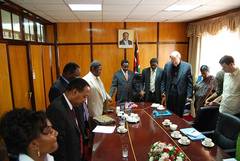Reflections by Rev. Dr. Stig Utnem
Rev. Stig Utnem, former general secretary of the Council on Ecumenical and International Relations of the Church of Norway, was part of the Living Letters solidarity team sent to Kenya by the World Council of Churches (WCC) from 30 January to 3 February 2008.
Read his personal reflections on this experience:
"Where is your community"? We can pose questions like this to one another because we appreciate diversity. We can also ask them to decide whether we will name the person we ask a friend or an enemy.
I left Kenya with a clear memory of one such confrontational moment. During the visit to one of the violence-stricken areas in the Rift Valley, one Kenyan asked another Kenyan this question in a rather harsh way. His fellow-Kenyan instead of answering asked back why the question was so important . Then the dialogue broke down.
To me this moment captures some of the tragedy which Kenya now faces. If ethnic or tribal or language identity is re-emerging as issue number one when people meet, then the country is in deep trouble.
To travel through the Rift Valley and meet with the violence-struck communities there, was indeed a sad day. Personally I was reminded of what I saw and heard as an Ecumenical Peace Monitor in Kwa Zulu-Natal in South Africa in February-March 1994 where - at that time - ANC and Inkatha were fighting one another in the rural areas. The burning of "the others" house, school and land and the killing, the revenge and the branding "we" versus "them"- all this came up in my mind on that day in the Rift Valley.
In situations where tribe and ethnicity and language matter more and more, the role of the churches and religious communities become paramount. Churches and ecumenical partners like my own must once again critically consider how the Gospel has been preached and heard and contextualized. Prayers for peace - offered in my country or in Kenya - can not only be a plead for "divine intervention", but must realize that God seeks and needs hearts and minds of people that are willing to be transformed by the Holy spirit to be peacemakers who reach out to "the others".
I agree with those Kenyans we met who spoke of three key issues that need to be dealt with:
- Responsibility to protect the vulnerable which must remain with the government as their first responsibility
- Space of grace for all Kenyans which means that in whatever community of region you live, you share the grace and the rights which are there for all
- Dialogue with groups of Kenyans that have not been properly heard during the decades since independence; first and foremost young people and women
It was encouraging to hear how the religious leaders in Kenya through the Inter Religious Forum worked together to address the situation almost on a day-to day basis. Personally I would have appreciated more time listening to representatives of non-christian religious leaders. It would have been particularly interesting to hear how the Inter Religious Forum see their role in the Kofi Annan-led mediation that takes place and in the healing and truth and reconciliation process that will be needed in the years to come. The contributions of the religious communities can be many-faceted and the different strategies must be carefully taken into critical consideration. I heard some of them be:
- To sit at the negotiation tables and represent "the people"
- To influence the agenda at the negotiating tables.
- To strengthen the negotiators and their mandate and popular support and prayer
- To do what the negotiators seldom do; prepare the people/all sides on the compromise that will come one day
- To plan for the national agenda of the next 10 years.
Peace is never made. Peace is always in the making in Kenya as in every country experiencing conflict. Peace agreements never created peace. It needs people who are transformed.
More information on the Living Letters visit to Kenya
National Council of Churches in Kenya
Background information on the Living Letters visits




